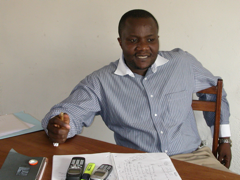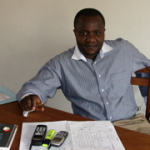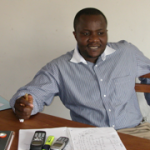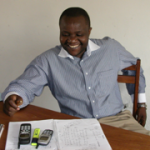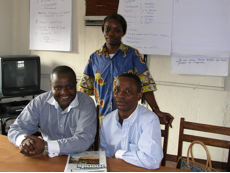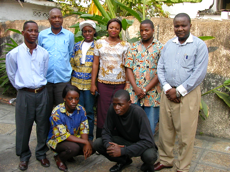The Legacy of the Belgian Congo and the Story of Mulegwa Zihindula
spokesperson for Pres. Joseph Kabila in 2002
Raised in a village in Eastern Congo. Became a Christian Pastor. Received a Masters Degree in Conflict Transformation at a University in the US. Served as Spokesperson for President Joseph Kabila in 2002. Helping thousands of residents in Kinshasa to begin to trust each other & their communities.
This interview was first published in 2002.
Mulegwa Zihindula, or Zee as he’s more commonly known is an irresistible, affable individual and one of the up and coming leaders of the Congolese peace and empowerment movement. Almost an archetype of the new generation in this war torn country, which is just beginning to stretch its neck out beyond its generations-old legacy of war, oppression, brutal leadership, and exploitation, Zee has a vision for his people. Born into poverty in a rural village in Eastern Congo, trained as a pastor in Nairobi, Kenya, Zee went on to higher education in America, babysitting Billy Graham’s grandchildren to help pay his school fees, and graduating first with a batchelors’ degree in liberal arts and then a master’s in conflict resolution. A close personal friend of the young and open minded president Joseph Kabila, Zee may well be one of the significant influences helping to shape the future of the land Joseph Conrad called “The Heart of Darkness.”
The Democratic Republic of the Congo, formerly Zaire, sits on top of Angola and Zambia and is flanked on the west by the much smaller Republic of Congo or Congo-Brassaville, and on the east by the unfortunate combination of Uganda, Rwanda, and Burundi. About one-quarter the size of the United States, DRC has one of the longest rivers in the world—the Congo, which traverses 2700 miles. Fortuitously situated in the center of the earth, the Congo’s rich territory spans the equator, giving it full growing seasons year round. Rich in copper, cobalt, diamonds, and other minerals, Congo may be the only country in the world with coltan veins, a highly valuable mineral used in the production of cell phones.
Ecologically rich as well, Congo is home to three of the four great apes species, 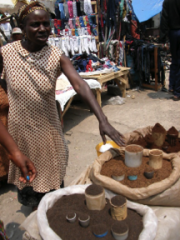 the only home for the bonobos or pygmy chimpanzees—those loveable, matriarchal apes, known for their peaceful and sensual nature. With 98% of their DNA identical to humans, they are our closest animal relative. Some, however, watching these affectionate creatures bonding, (as they are wont to do pretty much anywhere, anytime, and with any sexed partner) might wish to disown them much as a Baptist preacher would the groupies at a Woodstock love-in. As an evangelical missionary commented, “Gee, don’t they ever want a little privacy?” Congo is also home also to mountain and lowland gorillas (of Dian Fossey fame, best remembered by Sigourney Weaver’s Gorillas in the Mist), chimpanzees, and thousands of rare species of birds, plants, and fish. In parts still covered by dense jungle which hide tribes of pygmies and other forest peoples, Congo is hardly the arid, barren plains we might picture when we hear the word “Africa.” But, like the rest of the African continent this land has a rough history and has borne more than its share of man-imposed suffering.
the only home for the bonobos or pygmy chimpanzees—those loveable, matriarchal apes, known for their peaceful and sensual nature. With 98% of their DNA identical to humans, they are our closest animal relative. Some, however, watching these affectionate creatures bonding, (as they are wont to do pretty much anywhere, anytime, and with any sexed partner) might wish to disown them much as a Baptist preacher would the groupies at a Woodstock love-in. As an evangelical missionary commented, “Gee, don’t they ever want a little privacy?” Congo is also home also to mountain and lowland gorillas (of Dian Fossey fame, best remembered by Sigourney Weaver’s Gorillas in the Mist), chimpanzees, and thousands of rare species of birds, plants, and fish. In parts still covered by dense jungle which hide tribes of pygmies and other forest peoples, Congo is hardly the arid, barren plains we might picture when we hear the word “Africa.” But, like the rest of the African continent this land has a rough history and has borne more than its share of man-imposed suffering.
King Leopold of Belgium first took notice of the Congo in 1884 when the European nations parceled out Africa at the Berlin Conference. He called Congo “that magnificent African cake” and set out to extract as much of its riches as he could to line his personal coffers. He began the brutal slave trade in this country, intentionally destroying the ancient tribal structure by killing or exporting as slaves all the tribal chiefs and princes, brutally destabilizing the entire region.
The Belgium government, perhaps in part appalled by the extent of Leopold’s ruthlessness, 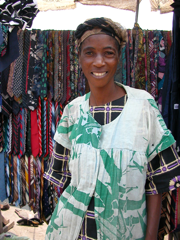 and assisted no doubt by their frustration that the king was not contributing any of his African wealth to the motherland, cast Leopold out from the Congo and took the country back under their protective Protestant wing. During the 19 years of Leopoldian rule, it is thought that between 5-10 million Congolese were killed, the first known, and little remembered, holocaust of modern times. It was a decidedly mixed blessing to have the Protestants as far as the Congolese were concerned. The Belgium’s built a road system connecting key village centers to the artery of the Congo river, built schools, churches, and new urban centers. But the Belgium’s continued the brutal slave exportation and continued some of the more macabre punitive practices to ensure that their still stiff quotas in goods and produce were dutifully met by the locals. Leopold had devised a system of paying for produce shortfall with human hands. No one knows how many hundreds of thousands of Congolese men, women, and children had one or both appendages chopped off to be smoked, dried, and set on top of the baskets of cassava or the stacks of wood that made their way down the Congo river to the Belgian counting houses in what was then called Stanleyville.
and assisted no doubt by their frustration that the king was not contributing any of his African wealth to the motherland, cast Leopold out from the Congo and took the country back under their protective Protestant wing. During the 19 years of Leopoldian rule, it is thought that between 5-10 million Congolese were killed, the first known, and little remembered, holocaust of modern times. It was a decidedly mixed blessing to have the Protestants as far as the Congolese were concerned. The Belgium’s built a road system connecting key village centers to the artery of the Congo river, built schools, churches, and new urban centers. But the Belgium’s continued the brutal slave exportation and continued some of the more macabre punitive practices to ensure that their still stiff quotas in goods and produce were dutifully met by the locals. Leopold had devised a system of paying for produce shortfall with human hands. No one knows how many hundreds of thousands of Congolese men, women, and children had one or both appendages chopped off to be smoked, dried, and set on top of the baskets of cassava or the stacks of wood that made their way down the Congo river to the Belgian counting houses in what was then called Stanleyville.
The exploration of slaves was finally abolished but the Belgians continued their control over Congo until 1960. The Congolese then installed their own ruler, Patrice Lumumba, in fair and democratic elections but he was not to last long. Though Lumumba seemed to have a positive vision for his country, the CIA—those defenders of democracy around the world—decided he would have to go and helped Lumumba’s chief of staff Joseph Mobutu seize power after six months. Lumumba fled and was assassinated a year later; international evidence later implicating both Mobutu and the CIA in his death. By installing Mobutu, and supporting his regime at first actively then tacitly for thirty years, the CIA snuffed the sparks of Africa’s fledgling democracy and earned its own share of the dark legacy of the Congo.
Soon after rising to power, Mobutu began what was to become three decades of terror, brutality, 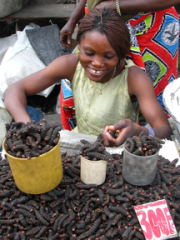 assassination, and further plunder of the country’s wealth for personal gain and personal waste. In 1972, Mobutu changed his name to Mobutu Sese Seko Kuku Ngbendu wa za Banga, officially translated as “the all-powerful warrior who, because of his endurance and inflexible will to win, will go from conquest to conquest leaving fire in his wake.” He made true on his name. Under Mobotu, the infrastructure of roads, schools, and public buildings established by the Belgians sank further and further into a state of disrepair. Roads reverted back into sand, buildings to rubble, commerce to lawlessness. Mobutu is perhaps best remembered for his signature leopard skin cap, his fleet of opulent mansions in the most exclusive spots in the world—his wine collection at his Portuguese castle was said to be worth $2.3 million—and for hosting the famed heavyweight boxing match between Muhammad Ali and George Forman in 1974. The fight was a mixed success, while millions from around the world tuned in to the stadium in Kinshasa, only a small proportion knew that this same stadium was where Mobutu held executions of hundreds he deemed disloyal. Even just before the boxing match he had so many killed as a show of his own power and control it was said that the floor below the stadium ran red with blood. Mobutu’s regime became commonly known as a “kleptocracy.” Corruption was rife on every level, and while the population was starving in the mid-1980s, the International Monetary Fund estimated that Mobutu’s personal fortune was peaking at around $4 billion.
assassination, and further plunder of the country’s wealth for personal gain and personal waste. In 1972, Mobutu changed his name to Mobutu Sese Seko Kuku Ngbendu wa za Banga, officially translated as “the all-powerful warrior who, because of his endurance and inflexible will to win, will go from conquest to conquest leaving fire in his wake.” He made true on his name. Under Mobotu, the infrastructure of roads, schools, and public buildings established by the Belgians sank further and further into a state of disrepair. Roads reverted back into sand, buildings to rubble, commerce to lawlessness. Mobutu is perhaps best remembered for his signature leopard skin cap, his fleet of opulent mansions in the most exclusive spots in the world—his wine collection at his Portuguese castle was said to be worth $2.3 million—and for hosting the famed heavyweight boxing match between Muhammad Ali and George Forman in 1974. The fight was a mixed success, while millions from around the world tuned in to the stadium in Kinshasa, only a small proportion knew that this same stadium was where Mobutu held executions of hundreds he deemed disloyal. Even just before the boxing match he had so many killed as a show of his own power and control it was said that the floor below the stadium ran red with blood. Mobutu’s regime became commonly known as a “kleptocracy.” Corruption was rife on every level, and while the population was starving in the mid-1980s, the International Monetary Fund estimated that Mobutu’s personal fortune was peaking at around $4 billion.
Finally, a welcomed regime change came in 1997. Laurent Kabila enjoyed a brief debut in power before he was assassinated in the Presidential Palace, in Kinshasa, by his own guards. Meanwhile, rebel forces were amassing arms on the eastern border of the country and waging what some have called the African World War—a war which has involved six African nations and taken upwards of three million Congolese lives. The troubles from within Uganda, Rwanda, and Burundi were not contained by their national borders. Soldiers, rebels and profiteers walked easily into Eastern Congo bringing with them brutality, greed, and lawlessness. Everyone, it seems, who can has, like little Jack Horner, tried to stick in their thumbs to pull out Congolese plums. Rumor has it that the Lebanese are running a lucrative coltan smuggling 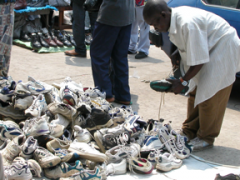 trade, making huge profits and leaving little for the Congo. Logging companies from Japan, China, and Germany are itching to proceed with huge timber contracts to harvest Congolese primary forest. American mining and oil companies are waiting only for a few more signs of relative peace to pursue large oil and mineral agreements which are unlikely to be in Congo’s favor. Congo’s southern neighbor, Angola, is currently begging for foreign aid to save its small population from starvation, while revenues from foreign—primarily American—owned Angolan oil companies exceed $26 million dollars a day.) No one is sure how bad the HIV/AIDs infection rate in DRC is, except that it seems more and more certain that the Rwandans, as they did in their own country, used rape by AIDs-infected soldiers as a weapon of war in Eastern Congo, leaving a multi-generational legacy of sorrow in their wake.
trade, making huge profits and leaving little for the Congo. Logging companies from Japan, China, and Germany are itching to proceed with huge timber contracts to harvest Congolese primary forest. American mining and oil companies are waiting only for a few more signs of relative peace to pursue large oil and mineral agreements which are unlikely to be in Congo’s favor. Congo’s southern neighbor, Angola, is currently begging for foreign aid to save its small population from starvation, while revenues from foreign—primarily American—owned Angolan oil companies exceed $26 million dollars a day.) No one is sure how bad the HIV/AIDs infection rate in DRC is, except that it seems more and more certain that the Rwandans, as they did in their own country, used rape by AIDs-infected soldiers as a weapon of war in Eastern Congo, leaving a multi-generational legacy of sorrow in their wake.
The young President Kabila, installed after his father was assassinated, seems to have a vision and a genuine interest in lifting his country up. He is engaging in dialog with representatives from all sides and has signed the first peace agreements with the Rwandans. With such a legacy, it is hard to imagine where one would even begin. Still, the Congolese have great spirit. Perhaps inseparably fused with the vibrant tenaciousness of jungle life, with the lull in fighting the Congolese are springing back to life to reclaim their country. The new generation, and individuals like Zee, may be what will make all the difference to its future.
Spiritual Activism & Peacebuilding: A Work in Progress: An interview with “Zee” Mulegwa Zihindula
Part I Grassroots Problems and Practical Solutions
Question: The Congo is in an unusual point in its evolution as a country. You’re coming out of decades of war and civil unrest and all the major systems and institutions need to be developed. You have established several programs at the grassroots level, serving over 2500 people from the Eastern side of the country in Bukavu to the West here in Kinshasa, to foster peace and create a foundation for a better future. I’d like to explore with you what your programs address and what your strategies and goals are.
Mulegwa Zihindula: We always say that peace building is a multifaceted effort—there isn’t one specific thing 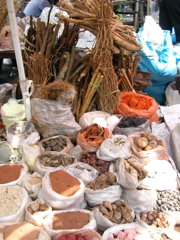 that will build peace in a country. In 1995, we began with an adult literacy project in Bukavu, in the Eastern Congo. The program, REDECO, is primarily for the social and economic empowerment of women. One of the things we do is give women small loans of about $20 to start their own business. It’s actually proving to be a strong deterrent against joining the armed rebellion. In the follow-up surveys we’ve done, many of the women told us that the reason they haven’t gone to pick up weapons is because of the loans—they say they have something to look forward to so they don’t need to join the gangs.
that will build peace in a country. In 1995, we began with an adult literacy project in Bukavu, in the Eastern Congo. The program, REDECO, is primarily for the social and economic empowerment of women. One of the things we do is give women small loans of about $20 to start their own business. It’s actually proving to be a strong deterrent against joining the armed rebellion. In the follow-up surveys we’ve done, many of the women told us that the reason they haven’t gone to pick up weapons is because of the loans—they say they have something to look forward to so they don’t need to join the gangs.
But our main program for peace building is The Center for Conflict Trans-formation here in Kinshasa. In the beginning, its vision was basically to work with people in the grassroots on community conflicts. There’s a lot of violence in this country mostly due to frustration. Many people have not had work for many many years; they live in a situation of desperation.
Initially, we set up a program to help girls who become pregnant out of wedlock. According to Congolese tradition, if a girl gets pregnant out of wedlock her family has to forcibly take her and drop her off on the doorstep of the boy who got her pregnant. A lot of girls were having a lot of problems—the boy and his family would often badly mistreat her. We felt it was necessary to intervene and do some kind of mediation work, to help the families find alternatives. So instead of the girl being taken by force to the boy’s house, we get both families to come together and work out how they will take care of her and the baby.
We also mediate conflicts concerning inheritance. When a man dies, his brothers are entitled to confiscate everything he owns including the house where his wife and children live. This happens in about 90% of the cases. It happened to my own mother. If the woman argues, her husband’s family often threaten to use witchcraft on her. The women become so afraid they just give in. It’s terrible. Imagine, she’s going through the agony of losing her husband and now she’s has the agony thinking, “He left me with ten kids, where am I going to live?” There are laws against this practice, but they aren’t being enforced. So first we set out to talk to the government to get them to enforce the laws and protect the women and children and then we went to the local areas and talked to the tribal chiefs. See, when the traditional chief speaks, it helps a lot. People listen them. We also do mediation. We had a case here in Bandudu—a girl’s father died. His relatives had never cared, never even visited them for fifteen-twenty years, but as soon as they found out he had died, they came to take everything he owned. There was a threat of violence. The older daughter was really upset. She said, “Let them come and I’m going to kill someone!” So we tried to do mediation and work something out.
Giving the Grassroots Voice in the Congolese Peace Talks
MZ: These were the cases we started with. But given the situation in this country, you begin to expand into other issues to do with the war pretty quickly. One thing we’ve been trying to do is give the population at the grassroots level a voice in the political process. They don’t have that now. They can’t choose their leaders and the politicians don’t care what they think.
When they began the Inter-Congolese Peace dialogs, we started some programs with the grassroots 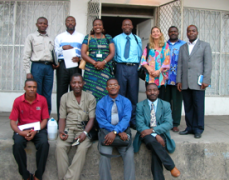 because we wanted them to be able to participate. We did surveys asking people, “What do you think should be the outcome of these dialogs?” Most of the people said, “We want the end of the war.” We’d broadcast their opinions on our own radio show and then call one of the politicians and a leader from the civil society and say “Look, the population is saying this, what do you think?” We’d force the politicians to listen to what the grassroots was saying.
because we wanted them to be able to participate. We did surveys asking people, “What do you think should be the outcome of these dialogs?” Most of the people said, “We want the end of the war.” We’d broadcast their opinions on our own radio show and then call one of the politicians and a leader from the civil society and say “Look, the population is saying this, what do you think?” We’d force the politicians to listen to what the grassroots was saying.
Our organization was officially represented at the Congolese Peace Talks in Habarone, Botswana. We took the main negotiating document and translated it into the four main Congolese languages and distributed it to the people so the grassroots would be able to know exactly what going on. We went into the provinces with a program called Mikona pala pala, interviewing people on the streets about the dialogs and then broadcasting what they said on the radio. We did the same thing during the Congo Peace Talks in Sun City, South Africa. There was a terrible gridlock during the talks, so our organization went all over the Congo, did surveys among the people about the talks, and distributed the results to all the politicians at Sun City to force them to concentrate on what they were supposed to be doing—which was work for the end of the war.
Elicitive Non-Violence Training
MZ: Now we are involved in a nonviolence campaign. Our culture has become so violent, people don’t even realize it. We have developed these elicitive trainings where we hold a community meeting and ask people to define violence in their own context. We don’t define violence for them. Everybody begins to talk and it opens up a whole can of worms, if I can say that. But it’s an opportunity for people to begin to think about what violence is. Many people at first didn’t consider beating up on their children violence. But usually after these meetings they’d say, “I didn’t realize it but I was really committing violence on my children. ” A lot of husbands used to beat up on their wives; they’d say, “It’s a disciplinary measure.” But usually after these meetings they have a whole different perspective.
We also have a follow up mechanism. We call it The Club of Friends of Non Violence and their job is to monitor violence 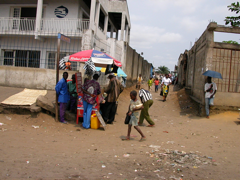 in the community. We bring these clubs of both men and women here about twice a month. They tell us what’s happening and develop their own solutions and alternatives to violence. We don’t tell them what to do—when people make their own decisions they’re more likely to uphold them. For example, if they know that Husband A beats his wife and that he usually beats her after he’s been drinking, they’ll begin to monitor this fellow and devise strategies. They find out when he comes from work and if they see him go drinking, they might go to his house and sit there. Because when he comes in drunk and sees people in his house its very difficult for him to beat up on his wife. So these kind of solutions, and it’s really beginning to work.
in the community. We bring these clubs of both men and women here about twice a month. They tell us what’s happening and develop their own solutions and alternatives to violence. We don’t tell them what to do—when people make their own decisions they’re more likely to uphold them. For example, if they know that Husband A beats his wife and that he usually beats her after he’s been drinking, they’ll begin to monitor this fellow and devise strategies. They find out when he comes from work and if they see him go drinking, they might go to his house and sit there. Because when he comes in drunk and sees people in his house its very difficult for him to beat up on his wife. So these kind of solutions, and it’s really beginning to work.
PART II Conflict of Perspectives –
The Grassroots , The Leadership, The International Aid Organizations
Q: This is a powerful example of spiritual activism. Was there a specific incident that inspired you to take up this cause?
MZ: Maybe it’s selfishness that got me to do this, but it comes from my own experience. 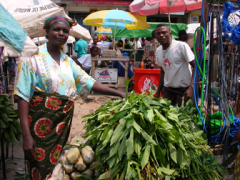 You see, I was born six months
You see, I was born six months
after my father died. My mom suffered a lot. She was illiterate, she couldn’t read or write so she couldn’t find work. We lived a very poor life as children. My father’s own brothers actually killed him. He was the most successful person in his family and because he didn’t do exactly what his brothers wanted, they decided to eliminate him and took everything he had. We had a very nice house, they took it away from us and we had to go and live in a mud hut. After I got my Masters degree in Conflict Resolution in the States, I thought it would be good for me to go home and try to do something.
Q: It’s interesting hearing your background and being in this country for a little while, you start to see several distinct strata of society all butting up against each other. There’s a tribal structure, which, although it’s been badly disrupted by the war, is still very influential among the majority of the population. There are strong family ties and loyalty to the tribal chiefs and there’s a natural protective relationship with the environment given their animistic religious beliefs. Then you have a Christian missionary-evangelical strata which has come out of and overlaps with the tribal culture in terms of some of their beliefs and social attitudes, but is also quite distinct. There’s loyalty to the broader base of the church, with its codified systems. The church has basically built the educational system in the Congo, and it has often been able to intervene and protect the human rights of women and children. Now you have a third strata emerging, mostly through those who were educated in the west in a modern liberal, scientific-materialist perspective. Having attended several meetings of Congolese NGOs, I could see the different perspectives, interests, and valid concerns from each of the different value systems clashing with one another. Sometimes these different centers of gravity were expressed by the same individual virtually within one paragraph. What’s your experience of this having grown up in a tribal community, become a Christian pastor, and graduated from an American University with a liberal arts degree in conflict mediation? How would you describe the growing pains in the Congo?
MZ: It’s a big challenge for someone who has lived in the United State to move back. 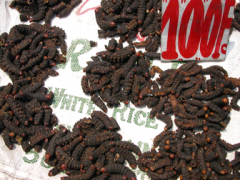 One thing you have to learn coming back from overseas is that if you come here because you want to teach people you will be very frustrated, you will not stay here, you will run away. But if you come here knowing there is a culture here, you cannot come and change the culture, you can learn from the culture of the country and you can try to develop your programs taking into consideration the culture in this country, you’ll have a better chance of succeeding. I think one of the problems many of my colleagues have had here is that they have not taken that aspect of the social culture into account. I think many of them have come here and tried to convert people. It’s very difficult to do that. You can have a situation in the United States where a husband beats up on his wife. You can have same problem here but the way the conflict is approached in the United States is not necessarily the way it’s going to be approached here. So you can certainly come with what you have learned in the United States but you also have to come here ready to learn. I had a rude awakening myself. When I came back I saw I had to take into consideration the social aspects of the culture here and see what I can learn from this culture to help people deal with their issues. For instance in this country they have an excellent system of conflict transformation at a grassroots level. When you go into the Bakongo Area, they have something called kinszonze. When there’s a conflict they go to the tribal chief, and the chief summons everybody involved to talk their problems out. It’s a system that is extremely effective. Before people begin to deal with their conflicts they dance a lot and that takes the tension away. They dance, they talk in proverbs, and that kind of thing—it’s very effective. It’s based on reconciliation which is very different than a penal system.
One thing you have to learn coming back from overseas is that if you come here because you want to teach people you will be very frustrated, you will not stay here, you will run away. But if you come here knowing there is a culture here, you cannot come and change the culture, you can learn from the culture of the country and you can try to develop your programs taking into consideration the culture in this country, you’ll have a better chance of succeeding. I think one of the problems many of my colleagues have had here is that they have not taken that aspect of the social culture into account. I think many of them have come here and tried to convert people. It’s very difficult to do that. You can have a situation in the United States where a husband beats up on his wife. You can have same problem here but the way the conflict is approached in the United States is not necessarily the way it’s going to be approached here. So you can certainly come with what you have learned in the United States but you also have to come here ready to learn. I had a rude awakening myself. When I came back I saw I had to take into consideration the social aspects of the culture here and see what I can learn from this culture to help people deal with their issues. For instance in this country they have an excellent system of conflict transformation at a grassroots level. When you go into the Bakongo Area, they have something called kinszonze. When there’s a conflict they go to the tribal chief, and the chief summons everybody involved to talk their problems out. It’s a system that is extremely effective. Before people begin to deal with their conflicts they dance a lot and that takes the tension away. They dance, they talk in proverbs, and that kind of thing—it’s very effective. It’s based on reconciliation which is very different than a penal system.
Q: You’re in an unusual position. You work directly with the poorer people at the grassroots level, at the same time you are very in touch with upper political echelons and are a close friend of the President Kabila’s. How does these complement each other? Where do you feel you are able to inform the political leadership with what you are doing on the grassroots level and where do you feel you’re able to mitigate some of the demands on the grassroots level with a broader view of where the government is headed? Obviously, the government can’t resolve all the problems at once, and may be working on more macro issues to build a foundation and infrastructure whose benefits haven’t yet been experienced by the population.
MZ: It’s been a special blessing for me to be in touch with both sides, both the top and the grassroots. I personally believe that peace building should be a “trickle up” program. In this country many people have tended to forget the grassroots, they always say these are not important people. The grassroots holds the key. That’s really where the power is. What has been good for me is the fact that I know what the people in the grassroots are thinking and I relay this information to the top. I can say, look you guys need to change, this is what the population is saying. I think in that regard it’s been very helpful and it’s very unusual for people to have this kind of voice. I also have contact with the middle ground. The international NGOs. This has been the biggest failure in this country. Some of these people come with programs from overseas, they say this is what we are going to do in Congo, without, as I was saying before, taking into account the social aspect of the culture. I try to help them too.
Q: Many educated Congolese are establishing their own NGOs. Rumor on the streets is that, for many, leading an NGO is becoming the “new profession” in and of itself, without the NGO necessarily have any legitimate work or results. What have you seen?
MZ: I think many people establish NGOs but they don’t have a vision and I don’t know how you can work without having a vision first. But I also know there are many Congolese NGOs here that are just NGOs on paper. They don’t do anything. They have no contact with the people. And they destroy the reputation of other NGOs that do work. I think the reason for this is the lack of employment in this country. People have to come up with schemes to be able to make work for themselves so they create an NGO on paper and start asking for funding. It’s a big problem.
Q: What role do you see the church or religion playing in bringing the Congolese people and the Congolese country forward?
MZ: There are two things that hold the Congolese people together in this country. One is music and the other is the church. You know people have been desperate for many years in this country, since the 1960s. Music makes people forget their troubles; it really holds the population together. The second thing is religion. It has also been a destructive force, you know some pastors take advantage of the poor people and say “give me your little bit of money and you’ll get back tenfold,” but overall I think the church has been good in trying to bring people together. In the south in America during slavery, the church played a big role, it was one place where people could meet and sing and share their troubles.
The Legacy of War
Q: What have been the effects of the war been on the population?
MZ: Oh, I could talk about that till Jesus comes back! It’s horrible. The situation was bad enough already but the war has just devastated the country. Last time I checked, in June 2000, the IRC in New York [International Rescue Commission] said 3.5 million people had been killed in this country. Most were killed by malnutrition and other disease because they don’t have access to medicine now because of the war. But many were killed by direct acts of violence. The war has been absolute devastation, complete devastation. The family structure’s been destroyed. You find some members in the east, others are in Goma, others are in Nimegwea, they’re too far from each other now to come back together. People in Kinshasa used to get their food from the east but that part of the country has been cut off. Now there’s almost no food here in Kinshasa and the people here are malnourished. The war has been just terrible and the sooner it can be over the better.
Q: Are people cynical?
MZ: I think people were hopeful when we went to the Inter-Congolese Peace Talks in Sun City, South Africa, in February, that it would be the end of the war. But now people are beginning to be desperate and pessimistic. They don’t find hope and nobody cares what they think if they don’t wear suits and ties. So yes, they are becoming cynical.
Zee and the staff at the Center for Conflict Transformation in Kinshasa
Looking Toward the Future
Q: This government seems to be committed to developing this country in an intelligent way and provide for the future at the same time.
MZ: I can’t speak for the government, I can speak for the President. I think the President is very committed. He has a vision for peace. He has a vision to reunite this country and I think he has a vision to rebuild this country. He has his hands tied, again because of the war but he wants the war to end. He has a formidable foe in front of him, which is Rwanda, Uganda, and Burundi. These countries have been in Congo for so long; they have been enjoying the wealth of this country and it’s going to be very difficult for them to go back to their own countries unless there is a military threat. In spite of these agreements that are being signed, they don’t seem to want to go. On the contrary. When they sign an agreement to withdraw troops the next day they reinforce them! It’s a big game. I think the international community really needs to get involved and try to end this nonsense.
Q: Congo has specific troubles and there are serious problems affecting the entire global population at this time. You can see the most extreme manifestations of many of these issues in Africa—over population, environmental degradation, scarcity of resources, very rapid globalization where modern culture is coming into contact with traditional cultures in ways that cause conflict and undermine the positive tribal social structures, etc. What do you think is the most important thing for us to do as individuals?
MZ: I think the most important thing anybody can do in the world for the Congo right now is to address the root cause of the problem in this country which is the war. You can say, “I’m going to send you ten bags of rice.” But those ten bags of rice will run out. What people need to do overseas really is to make people aware of the plight of the Congolese people like they were doing during the apartheid era in South Africa. There is not a whole lot of difference between the people occupying the eastern part of this country and the apartheid regime. The only difference is you could identify the people in the apartheid regime because they had a different skin. Now here you have these Rwandese and the Ugandans and they look just like Congolese people and it’s very difficult to identify these people as the ones who are persecuting the Congolese. I don’t think Congolese people are asking for the west to donate money or food. They want to have an opportunity to work for themselves in their own country. This is a rich country. We can do agriculture, we can do many things but it’s very very difficult in the actual context of war. I think this is the best thing you can do to help the population of this country is to say to the American government, “Why don’t you force Rwanda and Uganda to withdraw their troops from Congo” That’s it. Nothing else, just “withdraw your troops.” If the United States decides tomorrow, they will be out of Congo and that would be the best present for the people of this country.
Q: You’re full of energy and you’re constantly initiating new projects. You see people suffering—in the family situation, on a national level, and on an international level—but you’re very hopeful about what’s possible. What’s the source of your energy and enthusiasm?
MZ: My message is always about hope, that there’s a light at the end of the tunnel. My own life is testimony. I was in the gutter as a small boy, really in the gutter, in the trash can. And things worked out for me. I’m not saying that everybody’s going to become like me. But I don’t want to see my population in the gutter, whether it’s economically or whether it’s socially. I saw enough suffering in my own family as a small boy and I don’t think the rest of my population has to go through the same things I went through. This is my hope. I believe God created every human being and God’s intention was never that a person should suffer, whether it’s a woman or a man. Everybody has a right to live to their fullest potential. My population is not able to do that. And I’m not so sure I will rest till either that happens or I die, otherwise I will not have accomplished my mission in this world.
